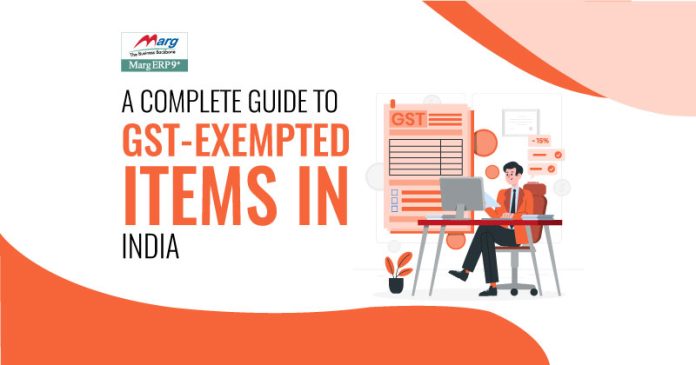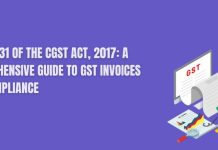The Goods and Services Tax (GST) is an important indirect tax reform in India, aiming to simplify the taxation process and boost economic growth. While most goods and services are included in GST, certain items are exempt from this tax. A few of you might be wondering what exactly we mean by exempt and why that is so important.
Let’s explain this in layman’s language. Exempt from GST means they are not included in tax or attract no GST at all. This exemption applies to both goods and services that are essential for daily life, agriculture, and social welfare.
As citizens, we all should be well aware of our tax policies, and in this article, we will provide a detailed synopsis of GST-exempted goods and services in India.
List of Exempted Goods under GST
The government has exempted several goods from GST to minimize the financial burden on the common people and promote economic activities in sectors like agriculture and healthcare. The following are some of the notable goods included in the GST-exempted good list:
Agricultural Products: Any raw agricultural product and livestock are exempt. Fresh fruits, vegetables, cereals, pulses, and grains that are not branded or packaged. Organic manure and seeds used for sowing are also exempt.
Dairy Products: Milk, curd, lassi, and other dairy products are exempt from GST when they are sold loose (i.e., not packaged) and without any branding. But if it is packaged in tetra packs, bottles, or any form of branded packaging, it may attract GST.
Unbranded Food Items: Flour, wheat, rice, bread, eggs, and other basic food items that are sold in loose form or without branding are GST-exempt.
Public Welfare Goods: Items like printed books, newspapers, handlooms, khadi products, and original handmade products are exempt to support traditional industries and public welfare.
Health, Medicines, and Medical Items: Most medicines and medical equipment are GST-exempted. Even human blood, tissues, all types of contraceptives, life-saving drugs, and vaccines for specified diseases fall under the GST exempted products list.
Educational Goods: Slates, chalks, blackboards, and any stationary items used in educational institutes are GST exempt.
Live Animals: Cows, buffaloes, sheep, goats, poultry, and other live animals are exempt from GST when not used for commercial breeding purposes.
Cultural and Social Welfare Products: Products made by disabled people, indigenous crafts, and clay idols are exempt to promote cultural and social inclusion.
Religious Items: Items used for religious practices, including idols, scriptures, and prayer beads, are generally exempt.
Why Are Only Unbranded and Unpackaged Products Exempt?
The GST exemption for unbranded and unpackaged products is designed to serve the local and small vendors.
Support local producers: small farmers, local vendors, and small-scale producers who sell their products in loose form, which is not a brand, are often from rural or semi-urban areas. The exemption helps and supports their livelihoods by reducing the tax burden.
Encourage Consumption of Essential Goods: By exempting unbranded and unpackaged products, the government aims to make essential items more affordable for low-income households, who mostly prefer to buy these products in loose or unbranded forms.
Differentiate Between Small and Large Players: Big companies that sell branded and packaged products are typically more capable of managing the tax requirements. Imposing GST on these products generates tax revenue. But imposing taxes on small and local vendors will only increase their burden and will not generate good revenue.
List of Exempted Services Under GST
Apart from goods, many essential services are also exempt from GST. Here is a list of exempted services under GST:
Educational Services: Services provided by pre-schools, higher secondary schools, and recognized universities, including transportation, catering, and accommodation services related to education, are exempt.
Healthcare Services: Services by a clinical establishment, authorized medical practitioner, or paramedics are exempt. This includes medical treatments, diagnostics, surgeries, and other healthcare services.
Agricultural Services: Services related to the cultivation of plants and rearing of animals, such as irrigation, harvesting, post-harvest storage, and warehousing, are GST-exempt.
Religious Services: Services provided by entities registered under Section 12AA of the Income Tax Act related to charitable or religious activities are exempt.
Public Transport: Transport services by non-air-conditioned roadways, railways for passengers, and metro travel are exempt from GST.
Government Services: Services provided by the central and state governments and local authorities, excluding a few specific services, are GST-exempt.
Financial Services: Interest on loans, sale of foreign exchange by banks, and services related to the issuance of securities are exempt from GST.
Cultural and Recreational Services: Services by artists and performers in folk or classical arts, recognized sports organizations, and certain recreational activities are exempt from GST.
Conclusion
The main goals of GST-exempted products are to provide relief to crucial goods and services, promote social welfare, and encourage specific economic activities. Knowing which products and services are exempt from GST can help consumers make informed decisions and businesses manage their tax compliance more effectively.
Stay aware of the GST-exempted products, and always consult the latest government notifications or your tax advisor for accurate and up-to-date information.
To know more, you can visit the following websites:
Central Board of Indirect Taxes and Customs (CBIC): https://cbic-gst.gov.in/
GST Council: https://gstcouncil.gov.in/




















